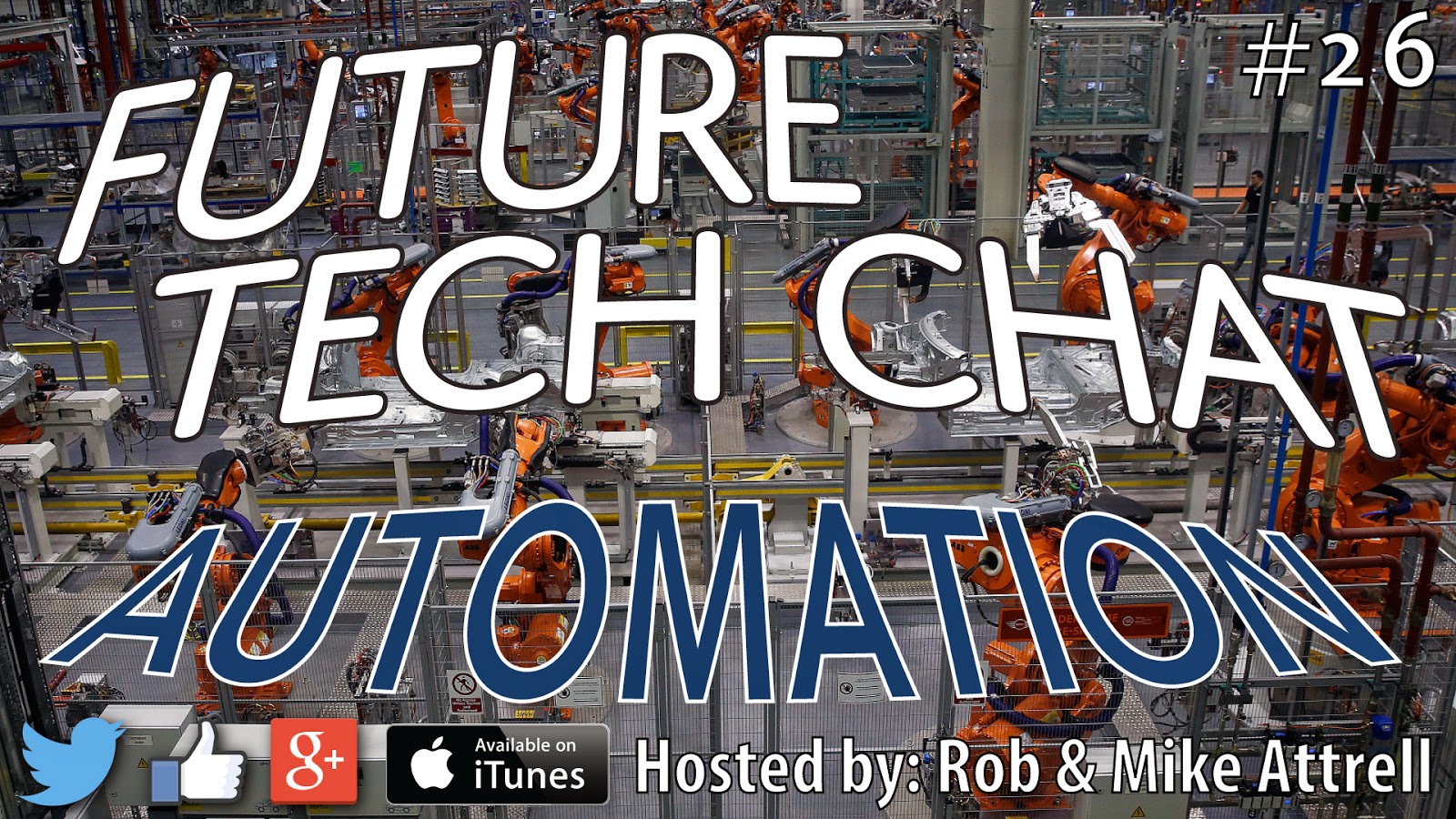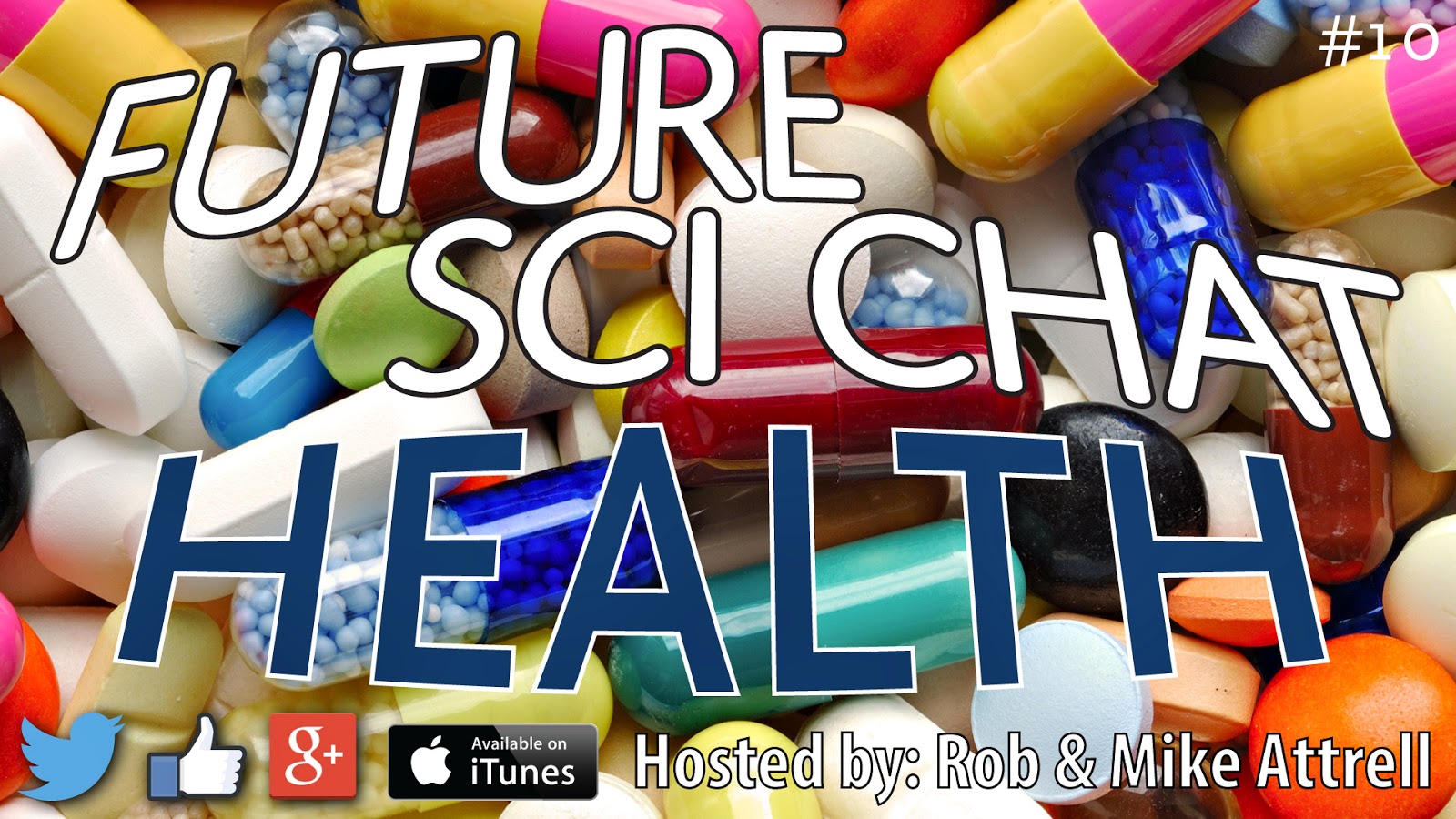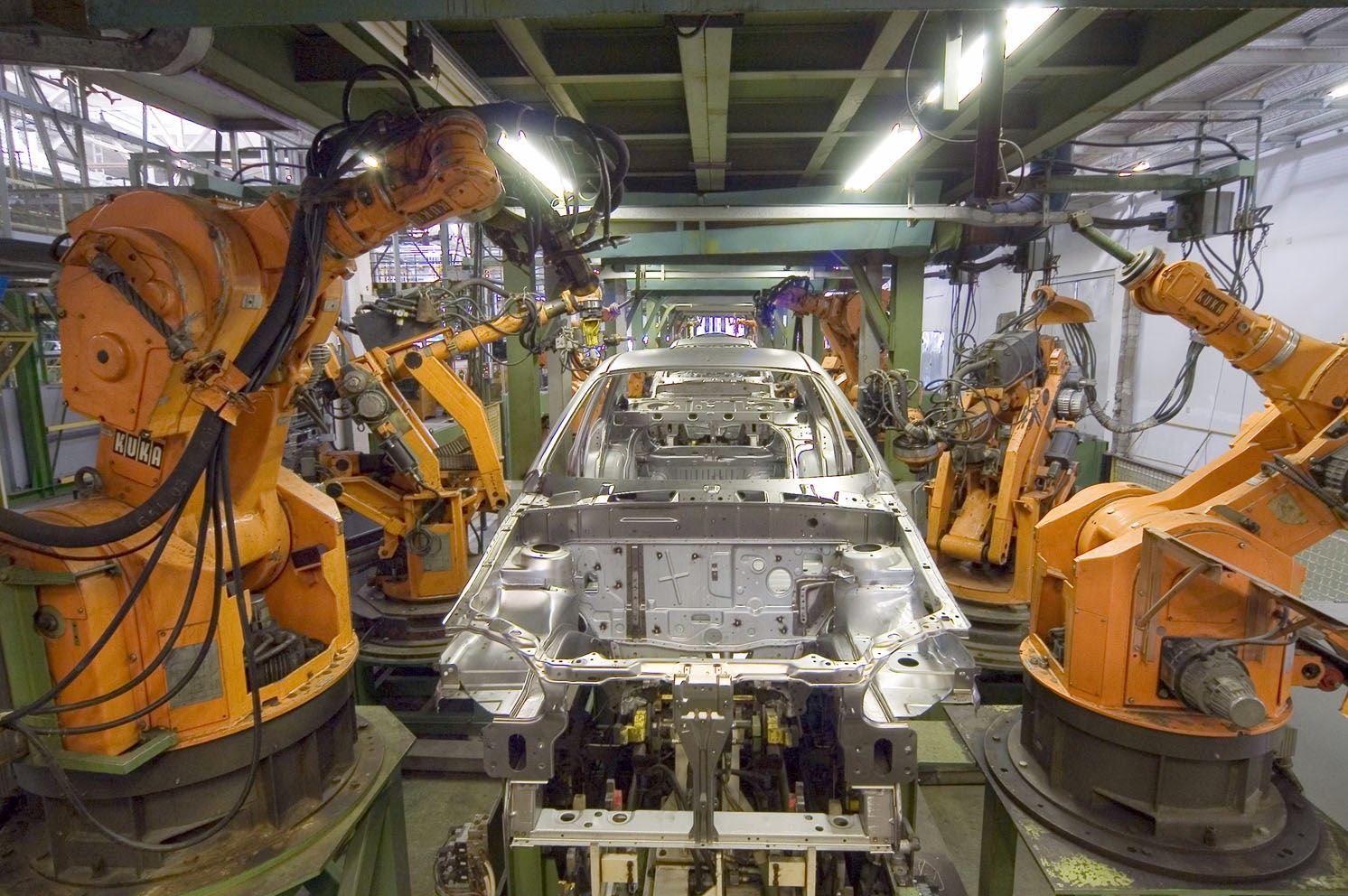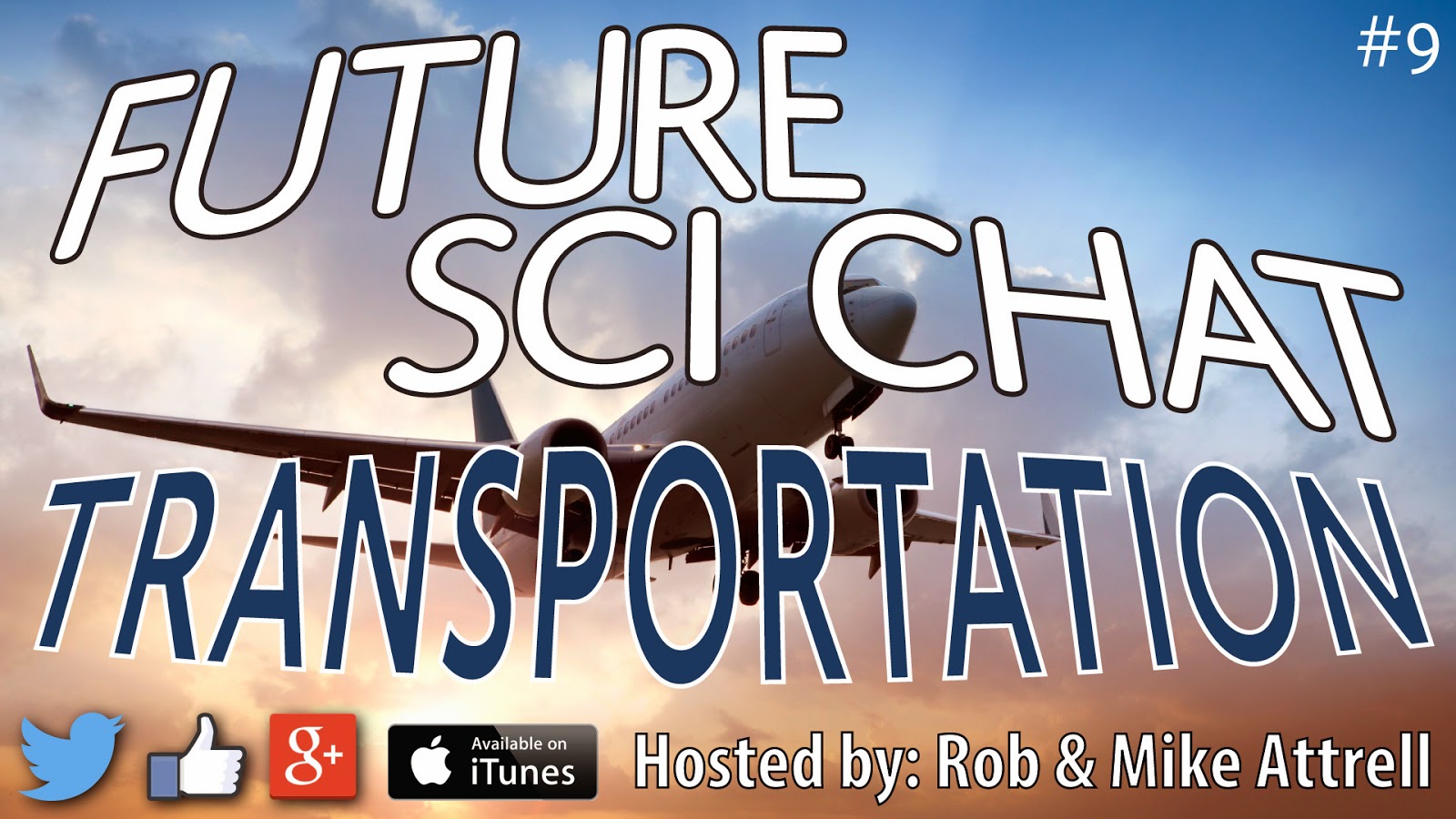This episode of Future Chat was all about Automation, how robots and algorithms will continue to take human work and do it more efficiently and more quickly. I had some help in the introduction from Alex from the UK, just another great example of automation.
Future Tech Chat #26: Automation
Tag: Science

Future Tech Chat #26: Automation

Attrell Update – Congrats to Crash Course!
This week on +Attrell Update, I share some news about something I love, +CrashCourse! My favourites +vlogbrothers will be working with +PBS Digital Studios to bring you new science videos in the near future! I can’t wait!If you want to keep up with these videos, click on the “i” in the top right of the video and subscribe!

Fake It Show #5: Fake it 'til you Mike it
+Mike Attrell joined me this week on Fake It to talk about parenting, adapting from student life to adult life, and the complexities of young people’s job hunts in our time.
5: Fake It ’til you Mike it
Future Sci Chat #11: The Paranormal
+Future Chat did a Hallowe’en episode this week, and that means that Rob dressed up for the show! We talked about all manner of supernatural and paranormal phenomena, like ghosts, psychics, and many other supposedly unexplained spooky events. We had a ton of fun this week!
Future Sci Chat #11: The Paranormal
Fake It Show #4: Interview with a Maddox
I had +Nick Maddox in the Fake It studios this week, to talk about his big move from Ontario and grad school, to Alberta and technical college. We also discussed the keys to successful relationships.
Fake it Show #4: Interview with a Maddox!function(a){var b=”embedly-platform”,c=”script”;if(!a.getElementById(b)){var d=a.createElement(c);d.id=b,d.src=(“https:”===document.location.protocol?”https”:”http”)+”://cdn.embedly.com/widgets/platform.js”;var e=document.getElementsByTagName(c)[0];e.parentNode.insertBefore(d,e)}}(document);
Future Sci Chat #10: Health
On +Future Chat this week, we went all in on health. Things like homeopathy, vitamin supplements, and extra strength medicine are all on the docket for discussion. We also talked about death in the aftershow, which was a very interesting discussion.
Next week, we will be taking a little break, so tune in on October 25th for a new episode!
Future Sci Chat #10: Health!function(a){var b=”embedly-platform”,c=”script”;if(!a.getElementById(b)){var d=a.createElement(c);d.id=b,d.src=(“https:”===document.location.protocol?”https”:”http”)+”://cdn.embedly.com/widgets/platform.js”;var e=document.getElementsByTagName(c)[0];e.parentNode.insertBefore(d,e)}}(document);
Generation Why? (Part 3)
In Part 1 and Part 2 of this story, I talk about my journey from post-secondary education to getting started with trying to make a career. This is Part 3.
As I talked about earlier this week, I am a huge believer in the concept of basic income. This is the idea that everybody in a given political system (city, county, province, country, etc.) would get a government cheque with an amount that would keep the poorest among us above the poverty line.
If you’re asking how a government could possibly afford this, it wouldn’t happen all at once. The program would obviously be a little bit more complicated than just giving everybody free money. Personal taxes would probably go up a little bit if you make more than the basic income amount. Businesses would have the opportunity to restructure their salaries so their employees would make about the same amount of money overall as they did before, and the corporate tax rate would also be raised since these businesses would now have some former salary that is no longer going to employees. Parents with children under 18 would receive additional benefits to keep their families above the poverty line, so that we could get a real chance at making sure no crimes are committed simply because somebody is poor. The economic stimulation from this system would undoubtedly be unbelievable, as suddenly the resources needed to run homeless shelters, hospitals, police forces, payday loan centres, etc., would suddenly drop precipitously.
There has been quite a bit of talk lately about the fact that automation in first world countries and factories around the world mean that human workers will come to be relied upon less and less. However, profits from companies that turn to automation won’t slow down, if anything they will become more efficient and make even more money. All of this could mean that we will have millions of people with no work to do, and corporations making incredible amounts of money (something that you will note is already happening in the US, and almost certainly in other places). Executives are making hundreds or thousands of times as much as their lowest employees, at a pace that is completely unsustainable in the long term. Increasing corporate tax rates for corporations that are innovative and forward-thinking enough to stay ahead of the curve on automation will still make more money, but they will pay a higher percentage of tax when their revenue gets into the hundreds of billions of dollars. This tax revenue can then be redistributed to former workers and those unable or unwilling to work to keep them from burdening society, but also keep them injecting money back into the economy.

Humans need not apply. At a certain point in the future, not everybody will have to work. The concept of the 40-hour work week is something that was made up by Henry Ford (it actually used to be higher than 40 hours on assembly lines, before child labour laws were a thing) when he decided to give people more time off work without a cut in pay so that people would be able to go out and actually have time to spend the money they were earning. If we took this even further, some people could go down to something like 15-25 hours a week, and still earn enough money during that time to make a comfortable living. Money itself is a human construct, and it’s becoming an increasingly virtual one. Estimates put the amount of cash in circulation at only about 10% of the world’s wealth. Saying that there isn’t enough money to give everybody enough to avoid malnutrition or starvation or disease or homelessness just isn’t realistic. In North America we throw away about half of the food that is produced because it goes bad or people will not eat it or it can’t be sold. Grocery stores do this, throwing away food after rendering it inedible while the homeless peddle for change.
What are we doing to our brothers and sisters?
Now, back to my generation. I talked yesterday for a bit about the concept of giving new graduates a stipend for (about) 6 months of salary to get them started on the right foot. If new post-secondary graduates didn’t have to worry about money fresh out of school, don’t you think there is SO much they could accomplish. If I had had 6 months paid for me out of school with the freedom to job hunt without fear of not getting a return on investment (over $60000 for 5 years of school), there would have been much less pressure to find a job fast, and I could think about what I really wanted to do with my life, and pursue that passion.
At this point, all things considered, my pre-career has been pretty great. I have been working a lot of fairly short, term contracts, with the theory being that I’ll eventually work my way into something permanent where I actually have a smidge of job security. University, though I enjoyed it greatly, did very little to prepare me for the concept of going out into the world and making myself known. I gained a modicum of notoriety at my school in my department, but that would only be useful if I had wanted to continue down the academic path. My options were severely limited after that point, and I had effectively no contacts in industries, because I was doing fundamental research with basically no real-world usefulness just yet (which I was fine with, but it didn’t help me out in any way career-wise).
It would be really great if the public service remembered the humble beginnings from whence it came. I have a lot to say about the nature of the government hiring process and the stress it puts on new hires trying to figure their lives out, but I think I’m going to save that for another time. All I have to say is that when you prioritize cheap labour with the bare minimum qualifications, you get what you pay for. Outsourcing your workforce to temp agencies might save you money in the short term, but when young people see how much easier life is in the private sector, you’re going to have a lot of difficulty attracting fresh faces who’ve already seen the brighter light.
University taught me a lot, but one thing it failed to prepare me for was the size you feel when you doff the ivory towers of your post-secondary institution and proceed on your own into the world. I know I have a lot of offer the world, and I’m going to get there one way or another. I’ll just take it 6 months at a time for now.
This concludes my thought-splosion on the state of affairs for students after university entering the workforce. Check out Part 1 and Part 2 from earlier this week as well.

Ask Rob #2: Ebola
This week on Ask Rob I address a question from Maureen about Ebola. It’s a scary disease that’s having its biggest outbreak ever this year. Here are some links where you can check out more information:http://www.who.int/mediacentre/factsheets/fs103/en/
http://www.cdc.gov/vhf/ebola/
http://www.doctorswithoutborders.org/our-work/medical-issues/ebola
http://www.vox.com/2014/10/9/6905347/too-afraid-to-ask-about-ebola-virus-outbreak-symptomsKeep your questions coming at [email protected] or click Ask Me Something on this blog to submit your question.You can also subscribe to my YouTube Channels or podcasts if you’re interested in learning more. Check it all out at robattrell.com!

Generation Why? (Part 1)
The North American workforce is getting older. That shouldn’t come as a surprise to anybody, because the North American population as a whole is getting older. We are living longer lives, and our working years extend further and further into what has long been considered “old age”. As a relatively new member of the adult population of North America, most of my experience working after attending university has come from short stints of contract work.
I have a pretty unique, and diverse, set of skills, and so far no employer of mine has managed to truly use me to anywhere near my full potential. This, perhaps, is a fundamental flaw in the way employment is generally sought today, or it might be a matter of me failing to sell my skills and experiences properly. In either case, I don’t think my situation is unique, or even rare. When applying for an adult job today, the typical process will involve some frantic online searches of job boards, adding a resume to employment sites like monster.com or LinkedIn, and perhaps reaching out to friends and family, either IRL or on social media.

I know that I’ve gotten many of my job opportunities through a variation of this process; since I hit a lot of “standard” job requirements, like a university degree, valid security clearance, and bilingual certification among the most sought-after in the Ottawa job landscape (especially in the public sector). However, through the 5-6 different jobs I’ve done since 2011 when I graduated with a Master’s degree, I’ve yet to really land somewhere where I feel like I am making a real difference in a way that satisfies me. I certainly haven’t had any success in getting a job in a science lab directly, although to be fair those opportunities are generally given to the HUGE number of graduates who got several years of experience in a real wet lab. My chemistry experience consisted mostly of performing simple chemical manipulations on relatively simple substances and then doing a physical analysis of the sample in question to determine its composition and structure (this is called physical chemistry).
When I was finishing high school, all I wanted to do was chemistry. I found science SO interesting and I still do spend most of my time talking and thinking about science and technology. That’s why I went and studied chemistry in university, I wanted to know more and come to a fuller understanding of science and the world around me. If I had the opportunity to go back today, I would probably choose to follow a path similar to Derek Muller, from Veritasium. He has a PhD in science education, and wrote his thesis about the use of multimedia to more effectively educate.
When I graduated at the end of 2011, all I really knew was that I didn’t want to spend my whole life working in academia doing fundamental research. I learned a TON from university, and especially from grad school, but I’m sure the majority of actual science I did there won’t help me much for the rest of my life. Since the beginning of 2013, I decided that I didn’t have any interest in just living out my life, I wanted to control my own destiny and learn to do things that I wanted to do, and to find out what I wanted to do.
One of the weird things I discovered when I finished school is that it’s relatively easy to get a job with a degree, but it’s a lot harder to get a job you actually want to do. I’m of the opinion that everybody deserves to do something they actually enjoy doing, or at least that they are getting enough money to do it that it is worth it for them. One of the hardest things I had to do in my life happened about 6 months after I finished school. I had been working at Canada Computers, an electronics and computer parts store, starting about a week after I defended my thesis. I got the job by seeing an opening, walking into the store, and being hired on the spot after the interview. That felt pretty good. I didn’t know a lot about computers at the time, but I was very interested in technology and excited to learn more. What I did learn was that I need stimulation at work, including working on new things and learning pretty much all the time, or I would be very bored.
So skip to June of that year, 6 months after finishing school, and working in retail full time. I was getting ready to attend my graduation ceremony, and decided that I needed to quit my job. I had a little bit of money saved after my schooling (grad school doesn’t pay all that well, but it was enough with some student loan money), and so I knew I could weather the unemployment storm for a little while, looking for gainful employment.
In the end, it took me a little over 6 months of no work to find a job. In fairness to myself, I took July and August of that year (the first two months) to relax and take the break I never got immediately after school ended. I did work a few odd jobs through that fall with placement agencies, but most of that time was spent applying to jobs, and teaching myself how to code. By the middle of January, I was getting pretty desperate, and I was looking for any opportunity to kickstart my adult life. It was at that time that I reached out to a local band (Sons of Pluto for those interested) to see if these friends I knew were interested in help with a website and social media strategy, since I didn’t have much to do those days.
The very next day, I got an email to meet with my future boss, and in the almost 2 years since, I’ve only had about 8 weeks of unemployment since that day when I reached out to take control of my own life destiny…but that’s just the beginning of the story.
Tune in for Part 2 of this story tomorrow, where I will talk about what I think would be a good way to let new adults entering the work force ease their way in, and about the difficulties I’ve faced since starting that “adult” job in starting my actual “adult” life.
Once you’re done Part 2, be sure to check out Part 3 as well, on basic income and the future of the workforce.

Future Sci Chat #9: Transportation
This week on +Future Chat, the topic was transportation. We talked about dream modes of transport, went into the science of engines, and got way off track talking about exploding party balloons.
We also had our first aftershow, which was REALLY fun!
Future Sci Chat #9: Transportation!function(a){var b=”embedly-platform”,c=”script”;if(!a.getElementById(b)){var d=a.createElement(c);d.id=b,d.src=(“https:”===document.location.protocol?”https”:”http”)+”://cdn.embedly.com/widgets/platform.js”;var e=document.getElementsByTagName(c)[0];e.parentNode.insertBefore(d,e)}}(document);








